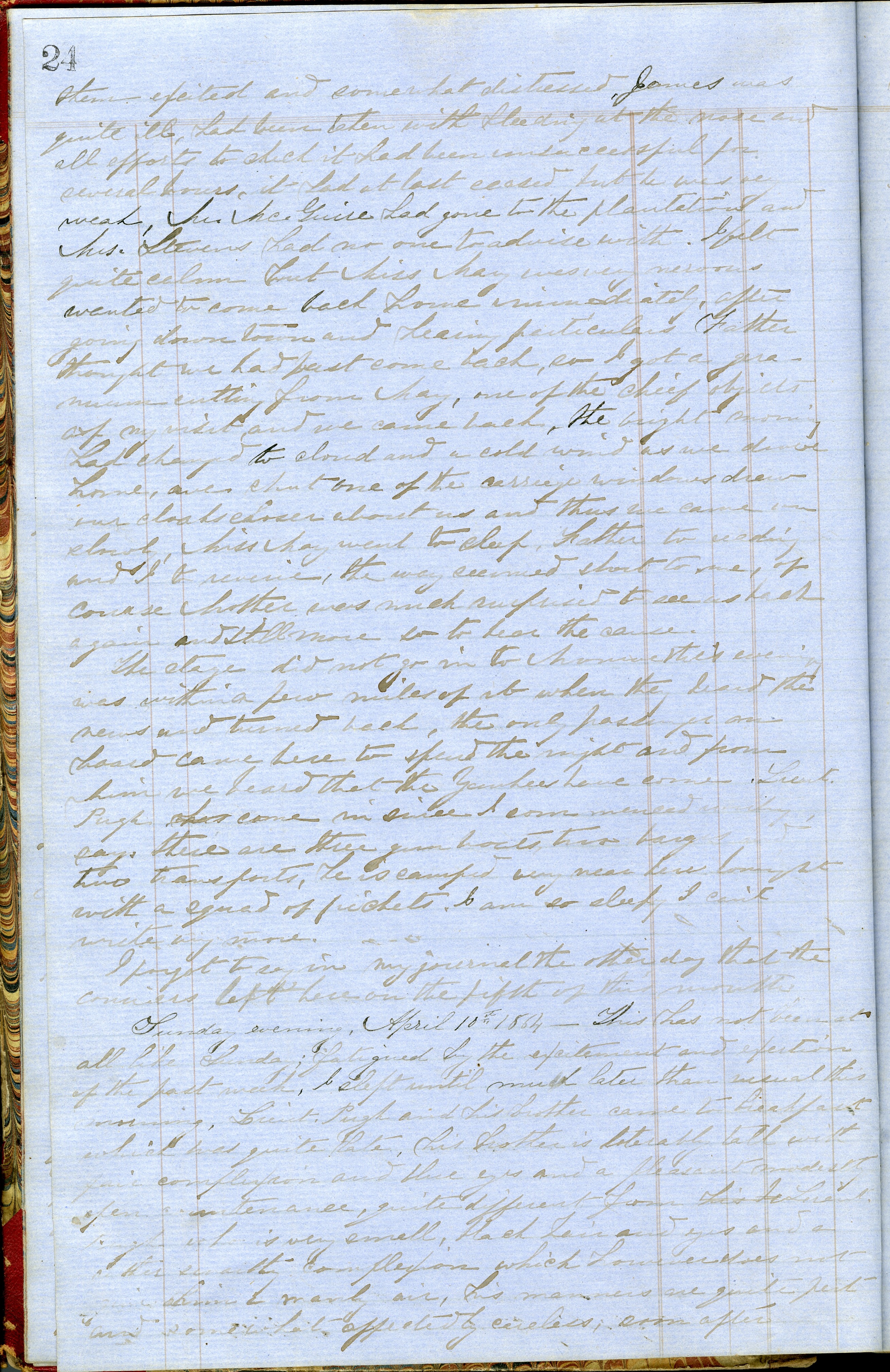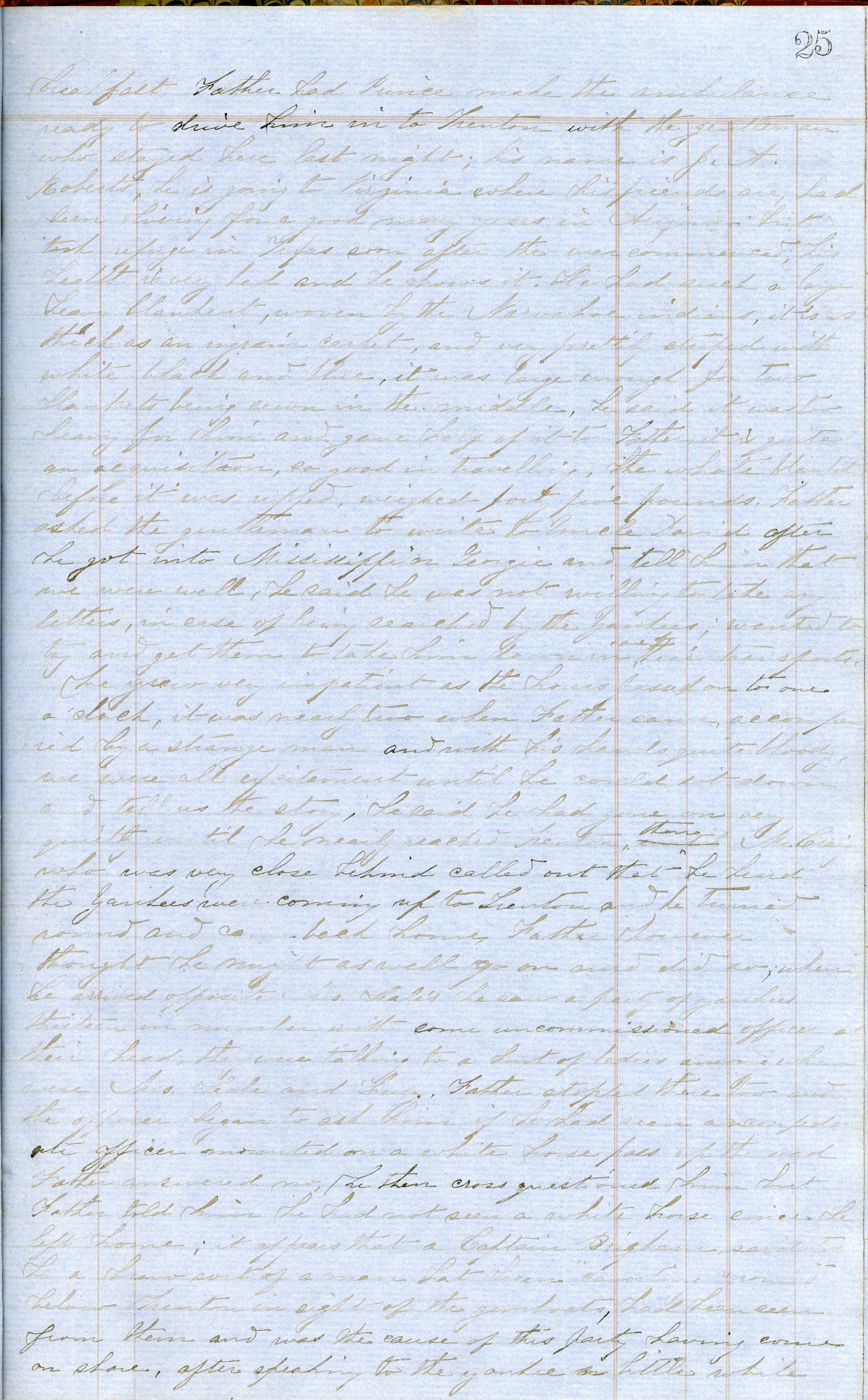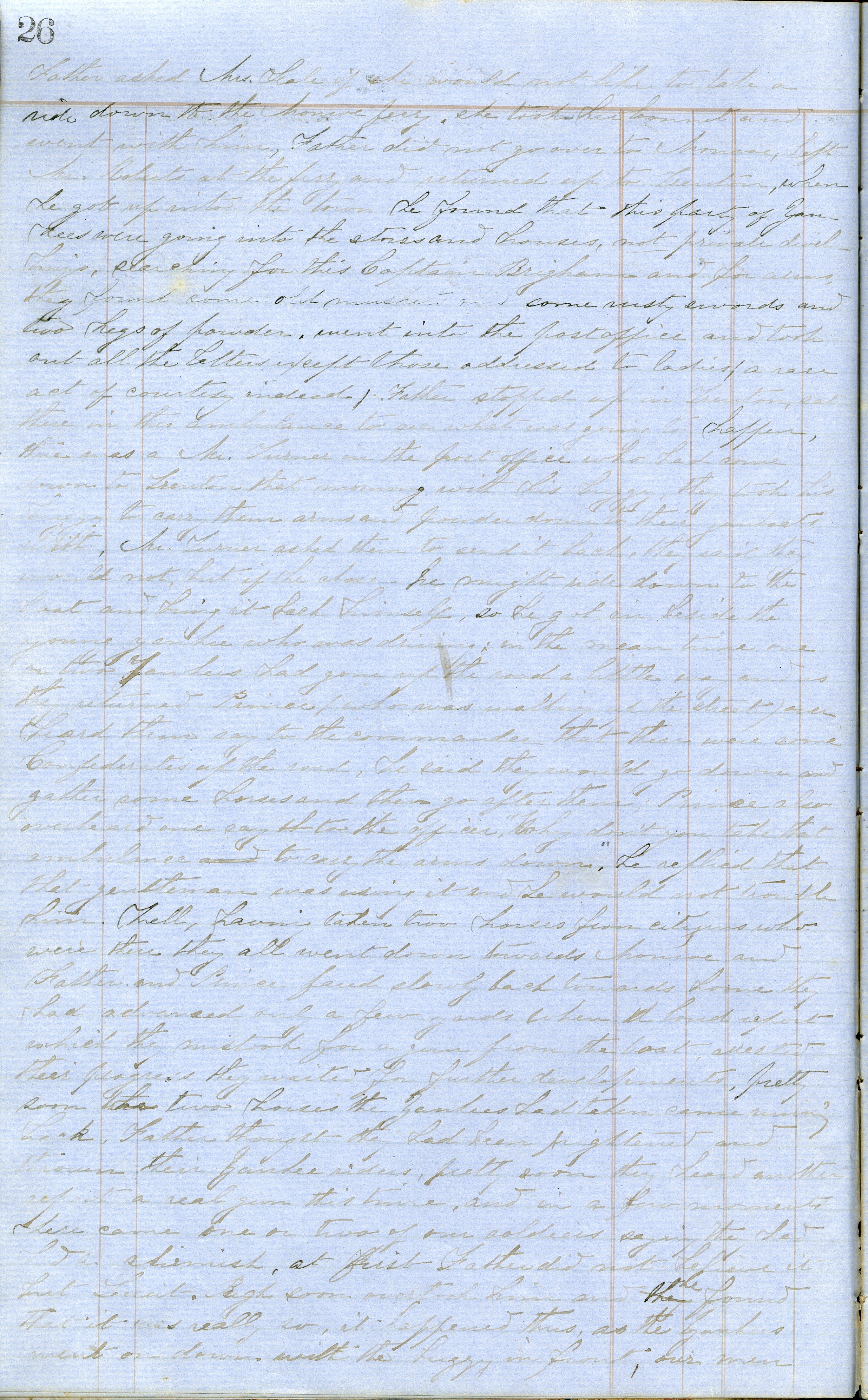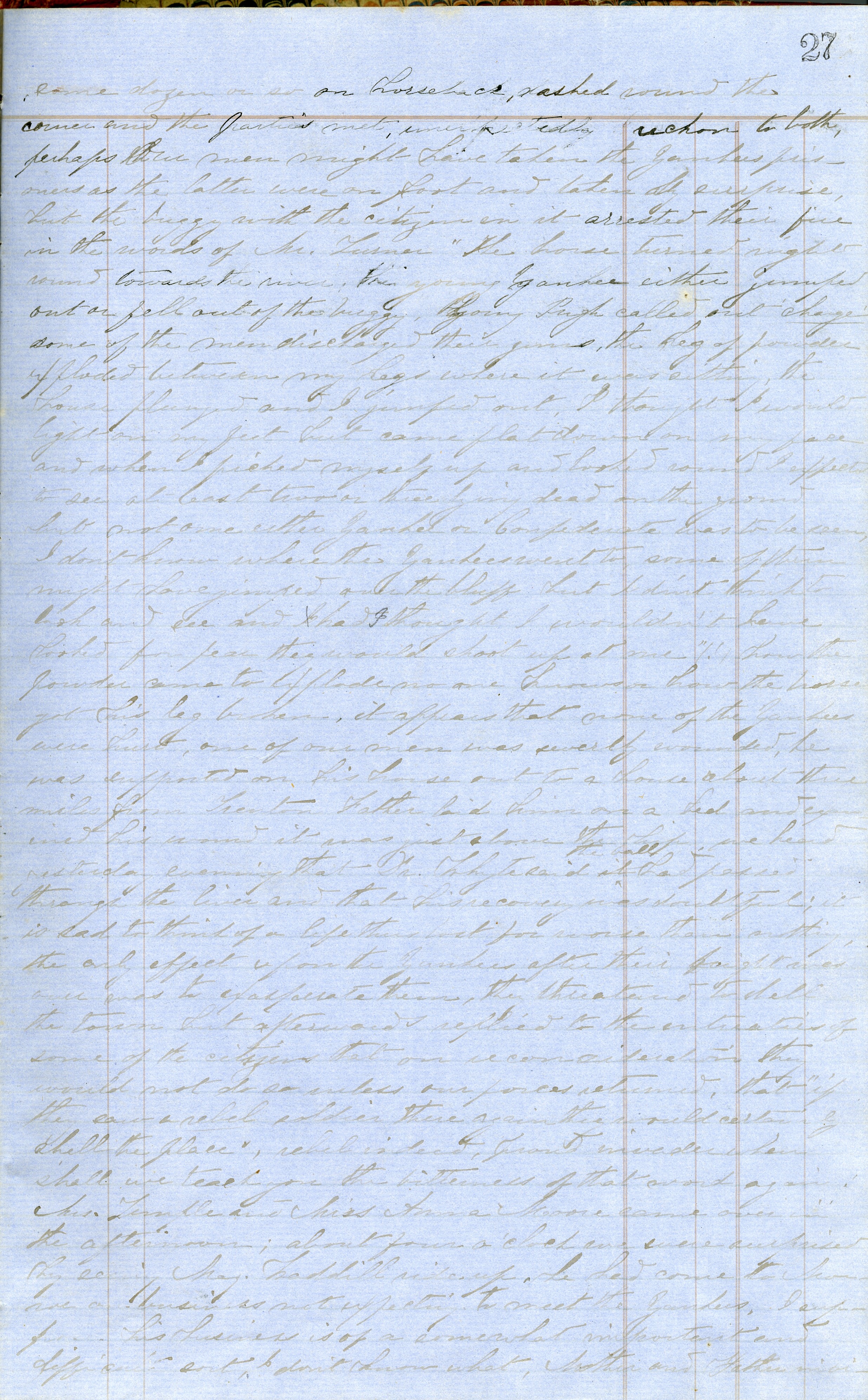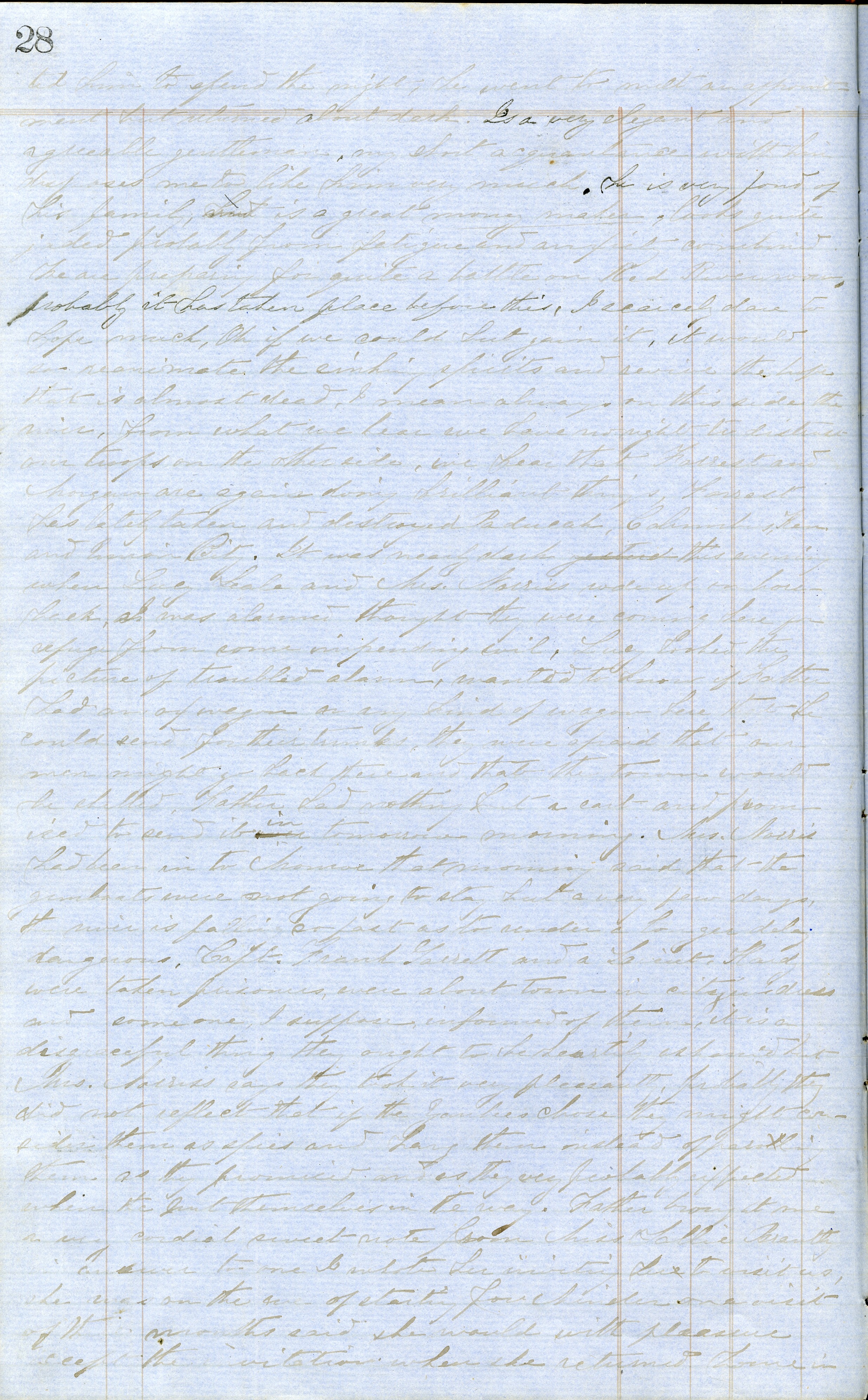Item Description: Diary entry, 15 April 1864, by Sarah Lois Wadley, describing the Union occupation of Monroe. Wadley was the daughter of William Morrill Wadley (1812?-1882) and Rebecca Barnard Everingham Wadley (fl. 1840-1884) and lived with her family in homes near Amite in Tangipahoa Parish, Monroe and Oakland in Ouachita Parish, La., and near Macon, Ga.
[Item transcription available below images]
Item Citation: From folder 5 of the Sarah Lois Wadley Papers # 1258, Southern Historical Collection, The Wilson Library, University of North Carolina at Chapel Hill.
Item Transcription:
Sunday evening, April 10th 1864
This has not been at all like Sunday; fatigued by the excitement and exertion of the past weeks, I slept until much later than usual this morning. Lieut. Pugh and his brother came to breakfast, which was quite late, his brother tolerably tall, with fair complexion and blue eyes and a pleasant modesty, open countenance, quite different from Lieut. Pugh who is quite small, black hair and eyes and a rather swarthy complexion, which however, does not give him a manly air, his manners are quite pert and somewhat affectedly careless, soon after breakfast Father had Prince make the ambulance ready to drive him in to Trenton with the gentleman who stayed here last night; his name is J. A. Roberts, he is going to Virginia where his friends are, had been living for a good many years in Arizona, but took refuge in Texas soon after the war commenced, his health is very bad, and he shows it. He had such a large, heavy blanket, woven by the Narvahoe indians, it is as thick as an ingrain carpet, and very prettily striped with white, black and blue, it was large enough for two blankets, being sewn in the middle, he said it was too heavy for him and gave half of it to Father, it is quite an acquisition, so good in travelling. The whole blanket before it was ripped weighed forty five pounds. Father asked the gentleman to write to Uncle David after he got into Mississippi or Georgia and tell him that we were well, he said he was not willing to take any letters, in case of being searched by the Yankees; wanted to try and get them to take him dawn in one of their transports.
We grew very impatient as the hours passed on to one o’clock, it was nearly two when Father came, accompanied by a strange man, and with his hands quite bloody, we were all excitement until he could sit down and tell us the story. He said he had gone on very quietly until he nearly reached Trenton, there Mr. Craig, who was very close behind, called out that he heard the Yankees were coming up to Trenton, and he turned round and came back home. Father however, thought he might as well go on and did so, when he arrived opposite Mrs. Seale’s he saw a party of Yankees, thirteen in number, with some uncommissioned officer at their head, they were talking to a knot of ladies, among whom were Mrs. Seale and Lucy. Father stopped then too, and the officer began to ask him if he had seen a Confederate officer mounted on a white horse pass up the road. Father told him he had not seen a white horse since he left home. It appears that a Captain Brigham, said to be a bravo sort of a man, had been “cavorting” round below Trenton in sight of the gunboats, had been seen from them, and was the cause of this party having come on shore. After speaking to the yankee a little while Father asked Mrs. Seale if she would not like to take a ride down to the Monroe ferry, she took her bonnet and went with him. Father did not go over to Monroe, left Mr. Roberts at the ferry and returned up to Trenton. When he got up into the town he found that this party of Yankees were going into the stores and houses, notprivate dwellings, searching for this Captain Brigham and for arms, they found some old muskets and some rusty swords and two kegs of powder, went into the post office and took out all the letters except those addressed to ladies, (a rare act of courtesy indeed).
Father stopped up in Trenton, sat there in the ambulance to see what was going to happen, them was a Mr. Turner in the post office who had come down to Trenton that morning with his buggy, they took his buggy to carry their arms and powder down to their gunboats with, Mr. Turner asked them to send it back, they said they would not, but if he chose he might ride down to the boat and bring it back himself, so he got in beside the young yankee who was driving. In the mean time one or two Yankees had gone up the road a little way, and as they returned Prince (who was walking up the street) overheard them say to the commander that there were some Confederates up the road, he said they would go down and gather some horses and then go after them. Prince also overheard one say to the officer, “Why don’t you take that ambulance to carry the arms down,” he replied that that gentleman was using it, and he would not trouble him. Well, having taken two horses from citizens who were there, they all went down towards Monroe, and Father and Prince faced slowly back towards home. They had advanced only a few yards when a loud report which they mistook for a gun from the boat arrested their progress, they waited for further developments, pretty soon the two horses the Yankees had taken came running back. Father thought they had been frightened and thrown their Yankee riders, pretty soon they heard another report, a real gun this time, and in a few moments here came one or two of our soldiers saying they had had a skirmish. At first Father did not believe it but Lieut. Pugh soon overtook him, and he found that it was really so. It happened thus, as the Yankees went on down with the buggy in front, our men, some dozen or so on horseback, dashed round the corner and the parties met, unexpectedly I reckon to both, perhaps our men might have taken the Yankees prisoners as the latter were on foot and taken by surprise, but the buggy with the citizen in it arrested their fire, in the words of Mr. Turner “The horse turned right round towards the river, the young Yankee either jumped or fell out of the buggy. Young Pugh called out ‘charge’, some of the men discharged their guns, the keg of powder exploded between my legs where it was sitting, the horse plunged and I jumped out. I thought I would light on my feet but came flat down on my face, and when I picked myself up and looked round I expected to see at least two or three lying dead on the ground, but not one either Yankee or Confederate was to be seen. I don’t know where the Yankees went to, some of them might have jumped over the bluff, but I didn’t think to look and see, and had I thought I wouldn’t have looked for fear they would shoot up at me!” how the powder came to explode no one knows, or how the horse got his leg broken, it appears that none of the Yankees were hurt. One of our men was severely wounded, he was supported on his horse out to a house about three miles from Trenton. Father laid him on a bed and examined his wound, it was just above the hip. We heard yesterday evening that Dr. Whyte said it, the ball, had passed through the liver and that his recovery was doubtful; it is sad to think of a life thus lost for worse than nothing. The only effect upon the Yankees after their fright was over was to exhasperate them, they threatened to shell the town but afterwards replied to the entreaties of some of the citizens that on reconsideration they would not do so unless our forces returned, that “if they saw a rebel soldier there again they would certainly shell the place,” rebel indeed, proud invaders, when shall we teach you the bitterness of that word again!
Mrs. Temple and Miss Anna Moore came over in the afternoon; about four o’clock we were surprised by seeing Major Waddill ride up, he had come to Monroe on business not expecting to meet the Yankees. I suppose his business is of a somewhat important and difficult sort, I don’t know what. Mother and Father invited him to spend the night, he went to meet an appointment but returned about dark. Is a very elegant and agreeable gentleman, my short acquaintance with him disposed me to like him very much, he is very fond of his family, and is a great money maker, looks quite jaded, probably from fatigue and anxiety combined.
We are preparing for quite a battle an Red River now, probably it has taken place before this, I scarcely dare to hope much. Oh, if we could but gain it, it would so reanimate the sinking spirits and revive the hope that is almost dead, I mean always on this side the river, from what we hear we have no right to distrust our troops on the other side. We hear that Forrest and Morgan are again doing brilliant things, Forrest has lately taken and destroyed Paducah, Columbus, Ken. and Union City.
It was nearly dark this evening when Lucy Seale and Mrs. Norriss rode up on horseback, I was alarmed, thought they were coming here for refuge from some impending evil. Lucy looked the picture of troubled alarm, wanted to know if Father had an ox wagon, or any kind of wagon here that he could send for their trunks, they were afraid that our men might go back there and that the town would be shelled. Father had nothing but a cart, and promised to send it in tomorrow morning. Mrs. Norris had been in to Monroe, that morning, said that the gunboats were not going to stay but a very few days, the river is falling so fast as to render a longer delay dangerous.
Capt. Frank Garrett and a Lieut. Hardy were taken prisoners, were about town in citizen’s dress and someone, I suppose, informed of them, it is a disgraceful thing they ought to be heartily ashamed, but Mrs. Norriss says they took it very pleasantly, probably they did not reflect that if the Yankees chose they might consider them as spies and hang them instead of parolling them an they promised, and as they very probably expected when they put themselves in the way. Father brought me a very cordial, sweet note from Miss Sallie Brantley in answer to one I wrote her inviting her to visit us, she was on the eve of starting for Minden on a visit of three months, said she would with pleasure accept the invitation when she returned home in July.

